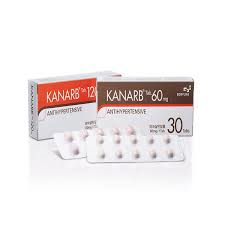The Health Science Authority (HSA) of Singapore government released a new drug safety alert for the fimasartan.

Fimasartan is a non-peptide angiotensin II receptor blocker (ARB) used for the treatment of hypertension and heart failure. On 09-Sep-2010, fimasartan was initially approved in South Korea and is marketed under the brand name Kanarb by Boryung Pharmaceuticals. In May 2017, it was approved by HAS to market in Singapore for the treatment of mild to moderate essential hypertension. This drug is not marketed in United States of America and in the countries of Europe Union (EU).

Fimasartan Tablets
Safety Profile of Fimasartan:
The adverse drug reactions documented for fimasartan during clinical development are dizziness (possibly due to hypotensive effect of drug), headache in few patients, diarrhea, syncope, and cold feet. An increase in hepatic enzymes (increased ALT, increased AST) was reported in the clinical trials of Kanarb® in the frequency of between 0.1% to less than 1%.
Case Reports of New Adverse Drug Reaction in Singapore:
In the year 2019, HSA received four adverse event reports of liver injury suspected with the use of fimasartan, which were assessed to be serious by the reporting doctors. Three patients were hospitalized due to this adverse reaction.
Case Report 1: A female patient of 65-year old with no underlying medical conditions and concomitant medications reported liver injury after exposure with fimasartan. The temporal relationship for the onset of symptoms of liver injury and fimasartan is 132 days. This patient had used similar therapeutic drug, Olmesartan (angiotensin II receptor blocker) for 10 years with no reported liver injury.
Case Report 2: A female patient of 85-year old developed liver injury after administration with fimasartan (temporal relationship for the onset of symptoms of liver injury and fimasartan is 151 days). Underlying medical conditions for this patient are hypertension, diabetes, and hyperlipidaemia. The concurrent medications reported for this patient are Linagliptin, amlodipine, atorvastatin, clopidogrel & trimetazidine (taken for a long time), Doxazosin (1 and a half months after fimasartan); Ginseng (once/month for a few years).
Case Report 3: A male patient of 70-year old had liver injury after administration with fimasartan (temporal relationship for the onset of symptoms of liver injury and fimasartan is 51 days). This patient also used similar therapeutic drug, Olmesartan with no reported liver injury. Hyperlipidaemia and hypertension are the underlying condition for this patient. The concurrent medications reported for this patient are fenofibrate and atorvastatin (2 – 3 years); Po Chai Pills, a traditional medicine (took for 2 days one month before Drug Induced Liver Injury DILI)
Case Report 4: A female patient of 57-year old had liver injury after administration with fimasartan (temporal relationship for the onset of symptoms of liver injury and fimasartan is 52 days). Underlying medical conditions for this patient are hypertension, diabetes, and hyperlipidaemia. The concurrent medications metformin, sitagliptin and atorvastatin (a few years); Traditional Chinese Medicines for gastric discomfort (two weeks before DILI).
In conclusion, The four patients in the age group of 57 to 85 years with underlying medical conditions of diabetes and hyperlipidaemia (in three patients) and the respective concomitant treatment medications were diagnosed with the liver injuries which could possibly be drug-induced after ruling out other possible causes (as per review by gastroenterologists). In the past, two patients were reported to have taken other ARB class of drugs without any liver issues.
The liver injuries reported were of varying severity, including two patients with elevated alanine aminotransferase (ALT) exceedingly more than 1,000U/L and jaundice. The patterns of liver toxicity were either hepatocellular or mixed (hepatocellular and cholestatic). These cases of possible drug-induced liver injury (DILI) occurred between 51 to 151 days after the initiation of fimasartan. All patients were reported to have recovered or were recovering after stopping fimasartan (a positive dechallenge scenario which could substantiate causal link between fimasartan and DILI).
Global Case reports of Fimasartan
WHO’s Global Drug Safety Database
The global pharmacovigilance database, VigiBase which is maintained by World Health Organisation (WHO) is having 221 adverse drug reaction (ADR) reports associated with fimasartan describing liver adverse events including increased hepatic enzymes such as ALT and aspartate aminotransferase (AST), increased blood bilirubin or gamma glutamyl transferase (GGTP) and hepatitis. These 221 case reports were received during the period of “2012 to January 2020”. Most of the cases were from South Korea where the drug is initially and primarily marketed.
From the Literature:
A case report of definite causality between fimasartan and hepatotoxicity (liver injury) was identified in the literature review published by DH Park et al.
Literature Case Report: A 73-year-old man in South Korea developed hepatotoxicity after exposure to fimasartan which occurred only ten months after the first dose. Patient’s underlying medical conditions such autoimmune diseases and infections were ruled out. Interestingly, the patient did not experience any AE with three other types of ARBs. The patient accidentally re-administered fimasartan for one month and the episode recurred (Positive Re challenge suggesting strong causal association). The authors strongly suggested that the cause of hepatotoxicity was fimasartan. The Roussel Uclaf Causality Assessment Method (RUCAM) scale score was eight for the first episode and 11 with the second episode of liver injury.
Liver Injury with other drugs of same class (angiotensin II receptor blocking agents)
Health Science Authority (HSA) of Singapore had received 12 AE reports of liver injury with losartan (5), telmisartan (2), olmesartan (1) and valsartan (4).
Advice for Health care professionals:
To consider the above safety information when prescribing fimasartan. Some signs and symptoms of liver injury include fatigue or excessive tiredness, nausea and vomiting, abdominal pain, and jaundice.
Healthcare professionals are also encouraged to monitor for any symptoms and report any suspected cases of liver injury related to the use of fimasartan.